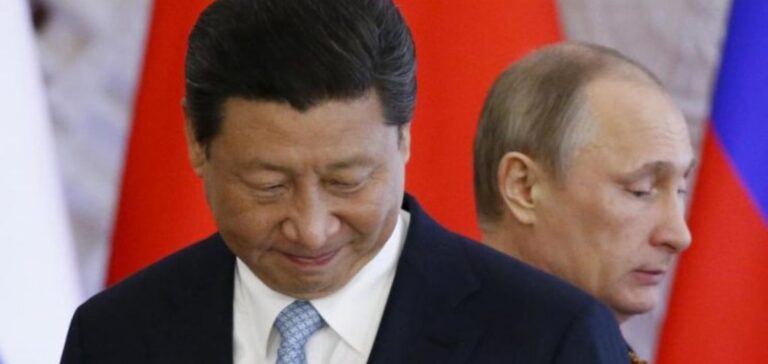Sino-Russian trade relations have been growing since theRussian offensive against Ukraine. Russia having been largely cut off from Europe, to keep its economy alive, the country has massively reoriented its trade relations towards China. Trade between the two countries reached a record $190 billion in 2022, despite international sanctions and the departure of many foreign companies from Russia. On the energy front, Moscow and Beijing have also accelerated their rapprochement. But experts warn of the risks of an unbalanced relationship and a weak position for Russia.
An economic partnership without limits
Before the Kremlin’s intervention in Ukraine, Vladimir Putin and Xi Jinping had brandished a “limitless” partnership between Russia and China. The message was clear: to be the counterweight to the West. Since then, trade has exploded, with bilateral trade reaching a record $190 billion in 2022. The share of the yuan in the currencies used for Russian foreign trade has risen in one year from 0.5% to 16%, leading to a dramatic reduction in the share of the euro and the dollar in Russian exports (now 48%).
On the energy front, their main source of trade, Moscow and Beijing have also accelerated their rapprochement. Economists from the Association of Major Global Banks and Financial Institutions (IIF) explain that “China and India have replaced the EU as the main export markets” for Russian oil, accounting “in the fourth quarter (2022), together with Turkey, for two-thirds of total Russian crude exports”.
Sino-Russian trade relations “unbalanced
However, experts warn of the risks of an “unbalanced” relationship and a weak position for Russia. Russia does not have many large economic partners, which makes it critical to turn to China. “The stability of the Russian economy now depends on China, which gives Beijing a new instrument to influence Russia directly,” says Temur Umarov, a specialist in Sino-Russian relations at the Carnegie Endowment for International Peace. However, the Kremlin contests this observation. “In these relations, there is no leader, no follower,” Vladimir Putin’s diplomatic adviser, Yuri Ushakov, said on Friday, referring to “two partners who trust each other and largely share the same goals.
The logistical and economic challenges of Sino-Russian trade relations
Many logistical challenges remain in further developing this partnership. The railway lines in the Russian Far East “are already saturated”, explains Anna Kireyeva, from the prestigious Moscow school of international relations MGIMO. “And modernizing them will take time.” In addition, the region’s hydrocarbon infrastructure, such as the Russian oil port of Kozmino on the Sea of Japan coast, also requires investment to meet China’s ever-increasing demand.
Economic consequences for Russia
The embargo and the cap on the sale price of Russian oil by the West since last December have had a negative impact on Moscow’s oil revenues. According to the International Energy Agency (IEA), these revenues fell by 42% in February compared to a year earlier, despite the same volume of oil traded. This weakens Russia’s position vis-à-vis China, which may seek to take advantage of this to gain economic benefits.
Moscow’s economic dependence on Beijing
China and Russia are supposed allies, but also competitors, as Timothy Ash reminds us. Beijing could thus seek to exploit Moscow’s weakened position to gain economic advantages. According to Temur Umarov, we are only at the beginning of the process of economic dependence of Moscow on China. However, in the years or decades to come, this economic lever could be transformed into an even more powerful political lever.






















